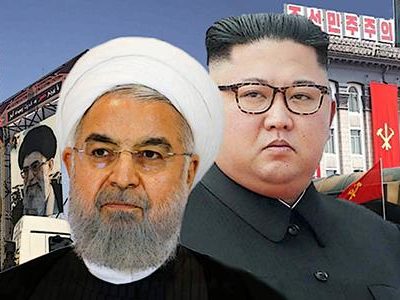Nathan Gardels is the editor-in-chief of Noema Magazine.
“Perhaps complete and verifiable denuclearization is not the goal in either case,” Michael McFaul wrote recently in The Washington Post. “In Iran, it may be that the real objective is regime change, including the option of U.S. military action. … If you are pursuing a policy of regime change, you have no interest in engagement or diplomacy; just the opposite, since you aim to vilify the autocrats in power to justify overthrowing them.”
“In North Korea,” the former American ambassador to Russia continues, “it could be that the goal is not complete denuclearization, but an outcome that allows Kim to maintain part of his nuclear arsenal while perhaps dismantling his ICBM program to reduce the direct threat to U.S. national security. This lesser goal could help to explain why Trump is so oddly accommodating toward North Korea, and so unwilling to increase pressure, even when Kim has signaled no credible commitment to complete denuclearization.”
The further irony, of course, is that this “lesser goal” for North Korea would in the end likely look much like the Iran accord negotiated by the Obama administration, which Trump scuttled. The Iran deal stopped the Islamic Republic from achieving a nuclear weapons capacity; North Korea already has scores of warheads in its arsenal.
If regime change through war with Iran is indeed on the minds of the Trump team, the U.S. Congress is mobilizing to stop that effort in its tracks. In The WorldPost this week, Senators Tom Udall and Richard J. Durbin plant their flag.
They write: “On the heels of the recent Middle East summit in Warsaw, Secretary of State Mike Pompeo and Israeli Prime Minister Benjamin Netanyahu made no effort to hide their intentions. ‘You can’t achieve stability in the Middle East without confronting Iran,’ Pompeo said. ‘It’s just not possible.’ Netanyahu remarked that the participating nations were ‘sitting down together with Israel in order to advance the common interest of war with Iran.’”
They continue: “The Trump administration has also been attempting to create a strong link between al-Qaeda and Iran — based on vague suggestions, but no hard evidence. There is speculation that administration officials are considering striking Iranian territory or its proxies, using the al-Qaeda narrative to claim legal authority for military action under the 2001 Authorization for Use of Military Force — the same authorization used to launch the Afghanistan war, now in its 18th year.”
They conclude with a call to not arm: “Congress must exercise its constitutional authority to counter the president’s reckless march toward war with Iran. Congress alone has the authority to declare war — not the president. Congress must make clear to the president that the United States will not enter another conflict in the Middle East without its approval. It is up to Congress to end the growing threat of a national security calamity, return our country to diplomacy and rebuild international trust in U.S. foreign policy.”
Yes, there are unsavory regimes in the world that America must stand up to in order to defang real threats. It should not shrink from this responsibility. But it was precisely the disastrous consequences of the regime change misadventures in Iraq and Libya that informed the Iran deal negotiated by the Obama administration along with Europe and with the support of China and Russia. Of all the inanities emanating from the Trump administration so far, to go down the counterproductive track of military intervention in the Middle East once again would be the most perilous.
Let’s hope that at least those on the other side of the separation of powers from the White House have sufficiently absorbed the lessons of the recent past to stop blithe warmongers before it is too late. Then a common-sense approach shorn of illusions might emerge: treating Iran like North Korea.





